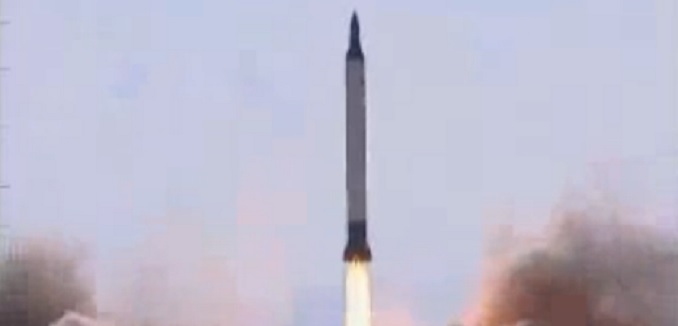Reversing assurances given last week to the Pulitzer Prize winning site PolitiFact by a National Security Council (NSC) source, the White House yesterday admitted to the Washington Free Beacon that an Iranian ballistic missile test would not put Tehran in violation of the recently signed Geneva agreement.
“That statement on ballistic missiles is incorrect,” the official told the Washington Free Beacon via email. “We have reached out to PolitiFact to correct”… The White House confirmed that a ballistic missile test would not invalidate the deal. “The prohibition would not include testing of a conventional ballistic missile,” according to the correction.
Those characterizations had the interim deal “ceas[ing] to exist” if Iran conducted a missile test. The controversy over the administration’s interpretation took on added urgency this week, with Mehdi Farahi, Iran’s Deputy Defense Minister and Head of Iran’s Aerospace Organization General, announcing that Iranian scientists will test a ballistic rocket within a week.
“Kavoshgar 7 will be launched next week as the next part of the plan to send living creatures into space,” Farahi said in Kish Island today.“6 Kavoshgars have already been sent into space so far, and this week the 7th Kavoshgar will be sent from Imam Khomeini base in Semnan province (Northern Iran) to an altitude 120km from the Earth,” he added.
The NSC misstatements risk being read against a similar incident, in which the administration announced via a fact-sheet that “Iran has committed to no further advances of its activities at Arak and to halt progress on its plutonium track,” only to back off that characterization after Iranian Foreign Minister Mohammed Javad Zarif declared that that Iran would continue work on its Arak plutonium facility. The new admission comes amid statements from Iranian military officials boasting that Israel is within the reach of Tehran’s missile arsenal and claiming that new laser technology had been installed to improve the accuracy of Iranian missiles to within 2 meters.
“The fixed precision of our long-range missiles has increased to the extent that we can hit every point we wish,” Brigadier General Hossein Dehqan said on Sunday, according to Iran’s Tasnim News Agency.
Iranian President Hassan Rouhani said on Monday that world powers have admitted failure in stopping Iran’s nuclear progress. “Iran’s policy of constructive interaction with the world states has forced the world to see the realities of Iran’s capabilities,” Rouhani said according to Iran’s Fars News Agency. “You see that those powers which were thinking of destroying Iran’s enrichment capability, have now admitted that they cannot stop Iran’s industrial progress and enrichment due to the indigenization of this industry and its expansion,” he said.
It is now known that the administration’s interpretation of the Geneva Joint Plan of Action allows Iran as to conduct unlimited uranium enrichment up to 3.5% purity, to bolster its plutonium production facility at Arak, and to test of ballistic missile technology that could be used to delivery nuclear weapons.
[Photo: PersianMedia / YouTube]




